Team Lead in a remote place: how I traveled with my family and worked from Greece and Vietnam
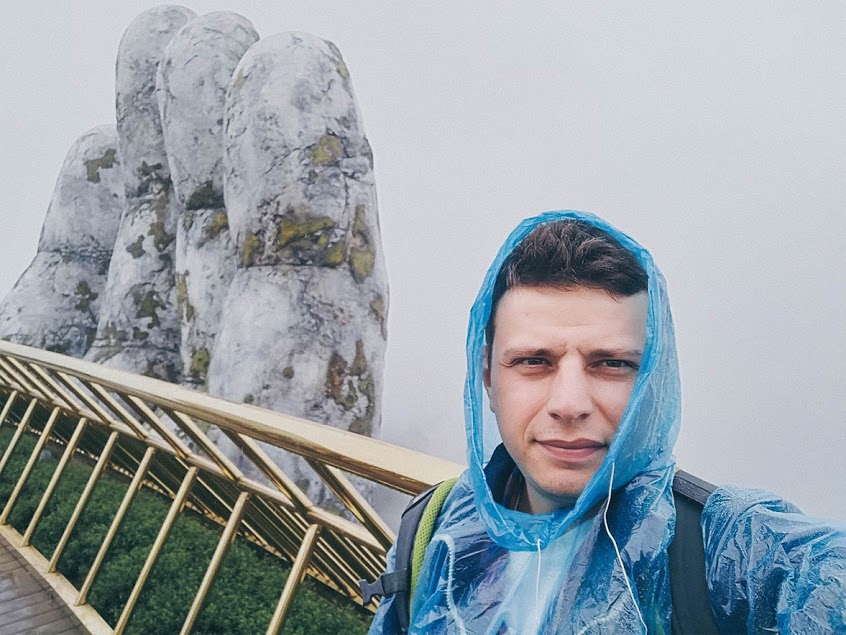
Hello everyone, my name is Alexander Bulanov, I am a developer and Team Lead at Django Stars. I love my job, and I also like to travel around the world, explore new countries and instead of the same landscape outside, see different ones.
Combining work and travel, I have already visited three countries: Germany, Greece and Vietnam. I didn’t go by myself, but with my family - my wife and two children (now they are 3 and 6 years old). Of course, at first I doubted whether it would be possible to combine work and actively get new impressions, but I quickly got involved and intend to continue in the same vein.
The first pancake - Berlin
The first trip took shape on its own. Once we were invited to visit a friend of his wife, who has been living in Berlin for several years. Active plans were only for the weekend, the time difference with Kiev was one hour, so there wasn’t much point on vacation, and I decided to work remotely. I thought: “When, if not now” - and we went.
Practice has shown that there is practically no difference, only outside the window is not Kiev, but Berlin. The work goes on as usual: I immediately joined the usual rhythm and worked synchronously with the whole team. One hour of time difference is nothing, so I didn't even have to rebuild.
While I was working, my wife was walking with the children: they explored the city and the surrounding playgrounds. Well, in the evening we all spent time together with friends. At the weekend we visited both Berlin zoos and tried to get around the maximum of attractions. All in all, it was a great little trip “in working mode”. For the first attempt - just right.
After this trip, I realized that I like working remotely. Not enough to write a statement and go to freelance, but just enough to repeat the experiment from time to time.
What's next: Greece and Vietnam
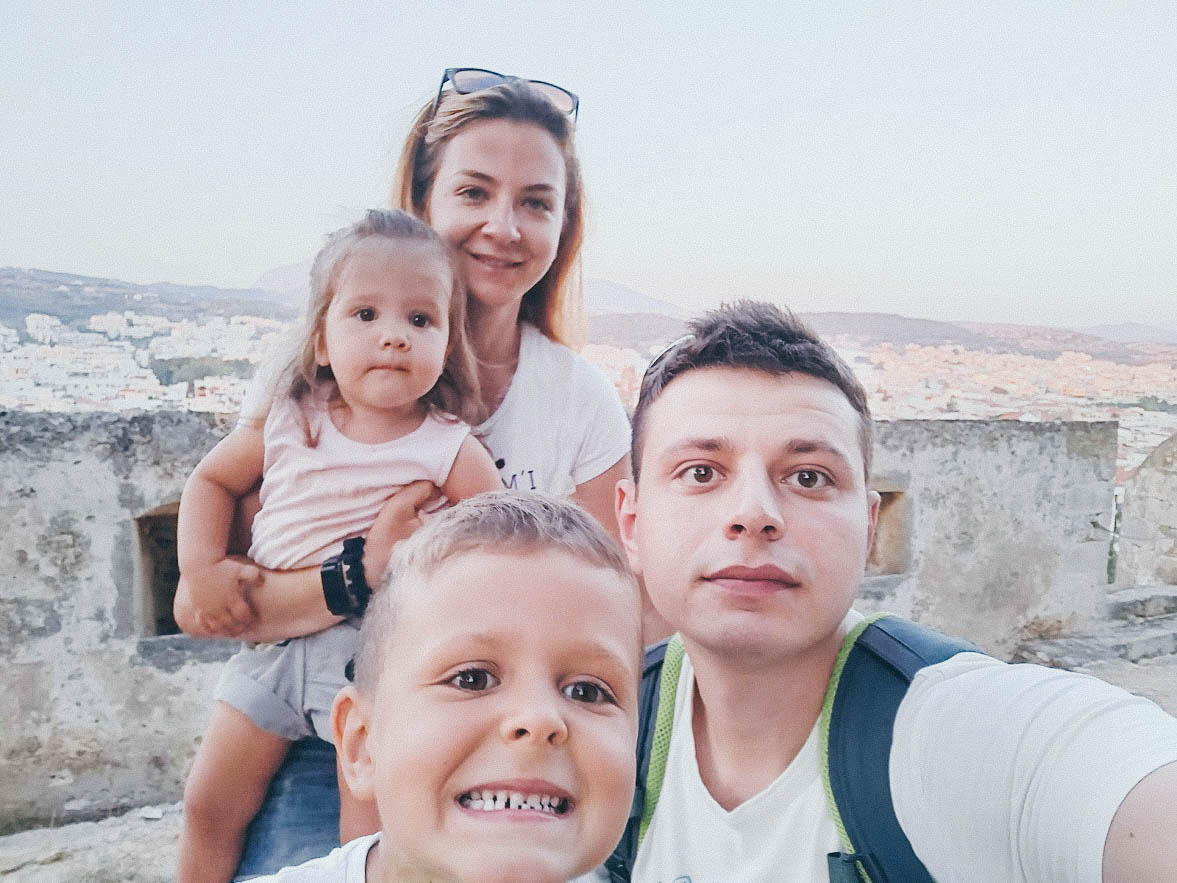
Next time we went for a whole month to Greece, to the island of Crete. We went with friends who also travel with the whole family. Since there were already 8 people with our children, we rented two apartments in the neighborhood.
I wanted to look at another country, relax, swim in the sea, so this time I took two weeks off from work to combine both work and beach-tourist regimes. Two weeks was just enough to come and settle in place, quench the thirst for impressions, swim in the sea and sunbathe. Then I returned to work - again, with the time difference between time zones.
What is important. In Cyprus, it is very hot during the day. And everyone knows how difficult it is to work when the brain literally melts from heat. Therefore, a well-functioning air conditioner is an important option if you intend to go somewhere south. No less important than good internet. And if there is no air conditioning in the apartment or hotel room, it is better to abandon this option and look for something else, even a little further from the sea, if the price is of great importance.
The weekday scenario was about the same as in Germany. During the day I worked, and spent evenings and weekends with my family exploring a new area.
I returned to the office, rested, full of strength and unashamedly sunbathed.
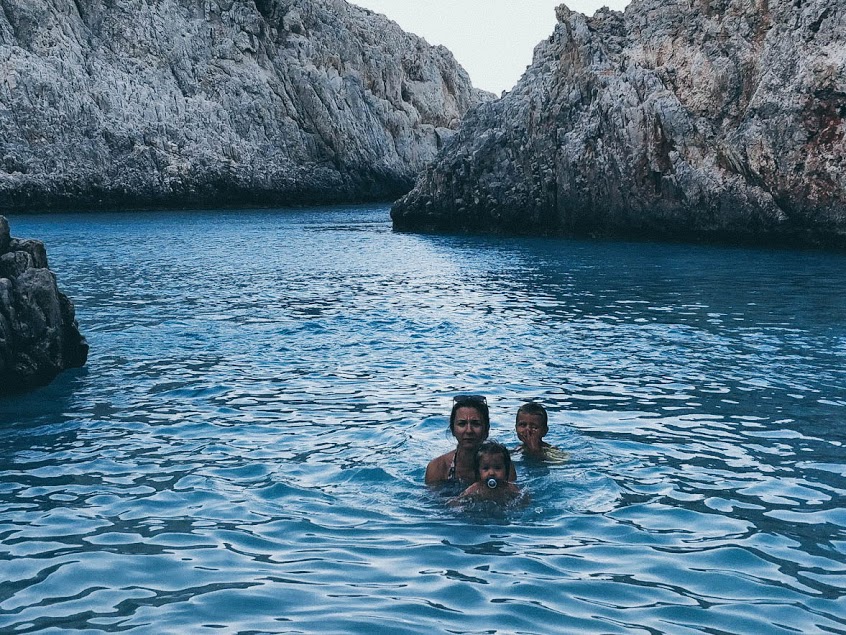
After Greece, we did not plan the next trip. That is, of course, we were sure that somehow we would definitely go somewhere ... But we did not think so soon. And one day, the same friends wrote to us with us in Crete, and they offered to tear together to Vietnam in the winter. Change the dull gray winter to the tropics and warm sea.
Traveling with children to Asia for a long time was scary, but the prospect was so seductive that I agreed - and immediately, without giving myself time to doubt, I bought tickets.
And then at two in the morning I went to look for a convenience store, because I really wanted to smoke.
From Amsterdam to Saigon via the Great Wall of China
The road to Vietnam has become a real adventure.
Flights are quite expensive. At that time, a family of 4 received about 2.5 thousand dollars - to put it mildly, not the most budget option. Friends suggested using their cheat code and flying from Amsterdam with a long change in Beijing. In this case, the flight route Amsterdam - Beijing - Ho Chi Minh City - Beijing - Amsterdam cost only $ 1349 for the whole family. Of course, we chose this option.
Sounds good at first glance. But! It was necessary to solve two problems: get to Amsterdam and pass the time in Beijing.
At that time, there were few direct cheap flights to Amsterdam, and New Year's Eve was just around the corner. In general, geographical proximity turned out to be a deceitful thing, and we, as they say, got crossroads, alternating trains and planes: Kiev - Lviv - Wiese - Nijmengen - Amsterdam.
Then I also took a few days off, but I really did not want to spend them on the road, so I planned all the transfers for the weekend, and on weekdays I was in touch with the team. To do this, I had to strain a little. For example, we arrived in Neymengem late in the evening, got to the house of our friends, and I immediately had to go to bed. I would rather sit and chat, but the next morning a meeting was planned.
Then there was a flight to Beijing with a long transfer, which everyone slept amicably in a hotel provided by the airline. And from there we flew to Ho Chi Minh City, where we received a visa upon arrival and went by train to Nha Trang.
It was not easy, but interesting. One of those moderately crazy but completely harmless episodes of the biography that you can then tell your friends and listen to the exclamations of surprise: “Wow, also with the children!” - in fact, nothing special. Again, the main thing is to plan everything in advance and calculate your strength.
Imperfect journey
Of course, I was thinking of driving through Vietnam by car. The country stretches from north to south and most interesting places can be visited by driving along the main highway AN1.
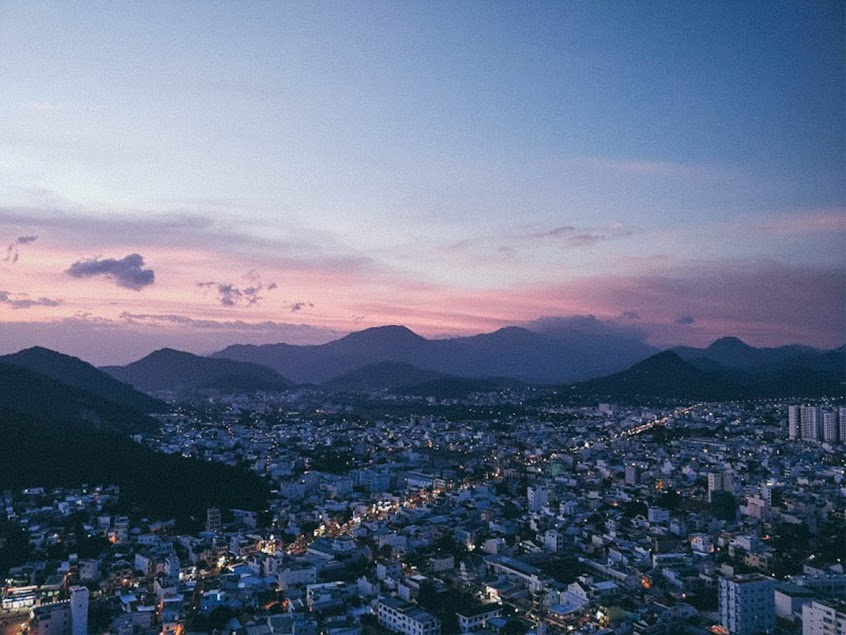
View from the apartment in Nha Trang
The ideal route in our view looked like this (you can take note - for a long time we compiled it according to the reviews and reports of travelers):
- Hanoi and surroundings. By neighborhood I mean the famous Ha Long Bay.
- Halong and a town in the Sapa Mountains, where you can stroll through ethnic villages.
- Ninbin, its national parks and temples.
- Fongnia Kebang National Park. Stunning scenery, the world's largest Shondong cave and a bunch of smaller caves.
- Hue. The citadel of the emperors of Vietnam, where their tombs are located, and there is also an active nightlife.
- Danang. The most famous resort for Europeans in Vietnam. It’s a little expensive, but I really wanted to see the passage.
- Hoian. A city-market where you can buy not only souvenirs, but also good quality clothes, shoes, crocodile leather accessories and similar exotic souvenirs.
- Nha Trang. This resort, in the end, has become our base, since there is a large selection of affordable housing and a great beach.
- Dalat. Very nice city in the mountains with cool atypical for Vietnam.
- Muine. The second most popular resort for Russian speakers after Nha Trang, a paradise for kitesurfers.
- Saigon, aka Ho Chi Minh City. A city where you can stay to live for years. A huge number of fashionable institutions, leisure and entertainment options. The metropolis of a healthy person.
Alas, we were not able to completely go through this ideal route. Firstly, Vietnam does not recognize international law and the idea of renting a car has disappeared by itself. It was possible to take bikes, as many travelers in Southeast Asia do, but with two young children we did not dare.
And then, still it was necessary to work. If we decided on such a rich rhythm with a large number of transfers, I would risk either the quality of my work or rest. And what's the point of traveling to distant lands, if you can’t really look around and enjoy?
We decided not to be greedy and settled in Nha Trang.
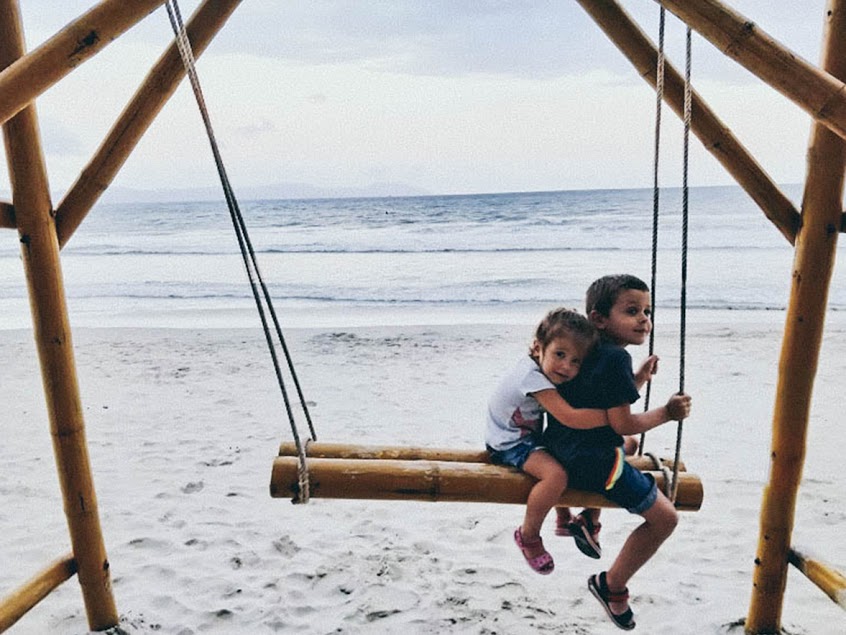
This is a resort on the coast of the South China Sea. The city is very comfortable for remote work, tracking the sides of the beach and traveling with children.
It is quite easy to rent housing there (many hotels, as well as apartments and houses rented through Airbnb). Excellent internet: high-speed, cheap and without surprises in the form of unexpected connection drops. If something needs to be decided absolutely urgently and unplanned, then the mobile 4G card and the working applications installed on the smartphone decide. That is, I was in touch in the same way as in Kiev, except for the physical presence in the office. As for the difference in time zones - yes, I had to adjust, but this is a completely resolved issue.
In general, we decided that it is better to rent a house in Nha Trang for the entire stay and from there already drive to explore the surroundings. I must say that we have never regretted such a decision. We rode in huge amusement parks on the sea and in the mountains, visited Buddhist temples and old cities, rested on tropical beaches, were in a zoo, catacombs, on the island of monkeys. Impressions charged for many months in advance.
On the way back to Ukraine, we were lucky: again there was a long change in Beijing, but this time it was a morning flight and enough energy for adventure. The airline provided a hotel, and China allowed for free to issue a short-term tourist visa. We had ten free hours and we hit the road to look at the Great Wall of China.

I must say, this was not the easiest quest. To assess the whole situation, you need to have at least some idea of the flow of tourists to the Chinese Wall (huge, just huge), traffic in the cities (very saturated) and how the Chinese speak English (usually nothing).
Having talked with the same friends who left a couple of days earlier and therefore scouted the road first, we decided not to philosophize crafty and take a taxi. The hotel administrator knew the time of our departure and helped us book a car, and together with the wait, we spent about $ 100 on the road. Not cheap, but worth it, in every way.
Work Points and Practical Issues
As I said, I am a developer and team lead at Django Stars . The project I work for is called PADI Travel . The irony is that, while working on a project related to diving and travel, I myself did not dare to immediately venture on a long trip. Although some colleagues travel quietly.
In our company, this is a fairly common practice. Not so much that you took it and drove off whenever you want, but if you are an adequate, obligatory and organized person, then it is quite possible to agree on such an experiment. And then again, if the first experience is successful.
I was afraid that I wouldn’t adapt to the new schedule because of my habit, I would fail, and the next time they wouldn’t let me go so easily. But it turned out that planning and organization skills are also useful on the remote. Yes, during long journeys there were difficulties: problems with the Internet or even the lack of the ability to access the network. But I didn’t plan moving to work days: either I used vacation days, or I went on weekends. And by the onset of working days, I managed to organize everything properly.
Of course, there is also the issue of coordination with the client. But in this case, this was not a problem, because PADI is an international team and they are used to it: work remotely, from different time zones.
What does a working day “on the other side of remoot” look like?
Spoiler: about the same as in the office.
I sit at home and work, my wife is engaged in children. They don’t interfere with me at all, since they practically never go home, and use their travel opportunities with might and main
We spend weekends together and try to see as many attractions as possible. Sometimes you want to just relax, because we devoted some weekend to active idleness. They just walked, sunbathed, bathed and relaxed, as far as possible with two small fidgets.

Remoot Internet and work schedule
The main thing in this matter is to establish communication and provide yourself with a comfortable “nest” for quiet work.
In Crete, for example, almost all apartments are rented without WiFi, and even if it is indicated in the description, most likely it will be WiFi from a nearby cafe or reception. I could not take risks and rely on an unreliable connection: what if the connection will be interrupted or will generally fall off during a call with a client? So we bought local sims. Operators were chosen after studying the coverage map and prices for different packages. In most countries of the world this is not a problem at all.
There was a funny case: after buying a SIM card in Crete, it turned out that the 4G package was disabled by default, only 3G (facepalm) was available. We studied the 4G coverage map, made sure that it is in our region. They called the support service of the local operator and talked with them for a long time - just like at home. Only then they included 4G to us.
But in Vietnam there were no communication problems at all - although, it would seem, we could expect the opposite. We bought cards with a huge data package for about $ 10 and used them all the time. 4G coverage is available almost throughout the country. My friend even managed to make a successful hourly phone call with a client when we were traveling by train to another city - for the sake of experiment, try to work at least once on a domestic train, even Intercity .
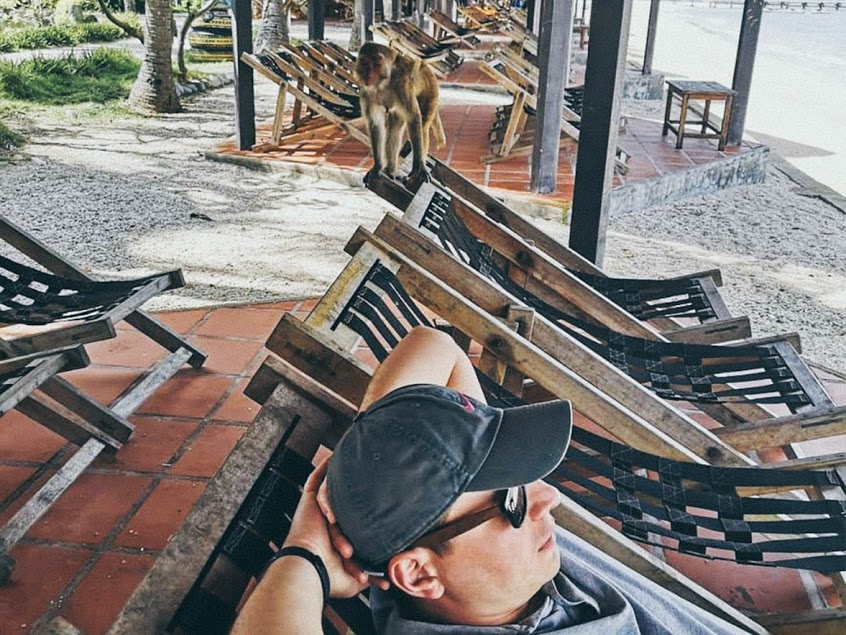
The only thing that was inconvenient - this time I had to adapt to the time the team worked. The difference between Crete and Kiev is only an hour, but in Vietnam I worked from 15-00 to 24-00 local time. The morning was free, it was possible to go with the family to the sea, buy groceries in a supermarket, go somewhere. But when you finish work at midnight, it’s time to go to bed and there is absolutely no time for walks or other rest.
“Apartments by the sea are inexpensive!” - organizational issues
I have already mentioned the importance of planning. For a person who is attached to the schedule and processes of the team, it is critically important to make sure that this very team does not notice any special changes, whether he is in the office or went to work from some distant Vietnam. Otherwise, this person is unlikely to be allowed to repeat, and the company, in this case, can be understood.
Here are a few points that you would like to do before you decide to go somewhere.
Gradual dive
I think that everything has turned out so well for me largely due to the fact that the first trip was very simple, without any special organizational difficulties and movements. Day work, evening and weekend - entertainment. Well, not in Kiev, but in Berlin. It’s more interesting, but not more complicated than in a familiar environment.
Therefore, I recommend to immerse yourself in remote work gradually. For a “pen test,” work a few days from home. Then go somewhere close so as not to immediately encounter a big time difference and significant differences in everyday life.
My level of travel difficulty increased gradually, and already in Vietnam I was ready, full of excitement and thirst for adventure, and even a significant difference in time zones was perceived as part of the general atmosphere.
Reconnaissance
You should not go to work remotely in a country about which you know absolutely nothing except a point on the map. You need to find out the maximum details in advance, otherwise, even in banal Egypt, you may encounter a problem: you have a call to the team and Skype is blocked. And in some more exotic China, even Google and Facebook will not work. Of course, many issues are resolved by a banal VPN, but this should be prepared in advance.
When planning a trip, look at the countries that are currently popular with remoters and freelancers. Most likely, everything is in order with the connection, it is easy to rent a house and there are even coworkings where you can conveniently work.
By the way, when studying the question, where do people most often work from in an attracted country? In Crete, working from a cafe is uncomfortable because of the heat and noise, you need to count on an apartment and choose it accordingly.
Travel planning
Then you need to "draw" the main checkpoints and think over all the issues related to transport. If we first bought tickets to Amsterdam, and then, after a while, attended to tickets to Vietnam, it would be either expensive or difficult and painful. Lack of sleep, deadlines, screaming children - that’s all.
Instead, we first found flights Amsterdam-Saigon-Amsterdam - for this you can use the services Skyscanner, Kiwi and the ticket aggregator among the Azair low-cost airlines - and immediately started looking for transport to Amsterdam. We looked at prices, dates, planned a 3-day stop in Nijmegen. Of course, they were still tired of moving, but it was quite within the reasonable framework.
Housing Search
The hotel is different, but generally it’s more convenient to work in the apartment, especially if you travel with your family. Moreover, it is better to make long stops: from two weeks to a month, depending on your plans - in order to have time and work, and relax, and explore the surroundings. Airbnb is best suited for this.
In Berlin, we lived with friends, but in Crete and Vietnam, I was looking for housing on this service.
Nuance with the countries of Southeast Asia (and not only). Reality does not always correspond to photographs, therefore the best option for a more or less long-term rental is to book a hotel for a couple of days, find options on the spot in Airbnb and see the accommodation in person. We did so when we arrived in Nha Trang. I wrote to the realtor, met with him to view the apartment - and he offered me another option, even more profitable than the previous one.
When we went to other cities on weekends, looked for hotels through the Agoda service, it is very popular in Asia. By the way, Vietnam was pleased that a lot of housing is equipped with a fully equipped kitchen - so for those who like to cook at home, rather than eat in a cafe, it’s just an earthly paradise. Again, for a family with children it is very valuable.
The search for housing "the old fashioned way" - offline - in Asia every year becomes an increasingly senseless waste of time and effort. Even the seediest hostels place ads on Booking, Agoda and Airbnb, and they look at the strange whites who come and ask with surprise: “Do you have internet? Wild people ... "
Mobile Internet
There is a golden rule: you need to have at least two Internet sources so that there isn’t a classic one: “Sorry, I’m here because of the weather ...” Of course, if you are on an island and there is a hurricane on the island, it’s likely that you will have to spend several days without any connection with civilization (but it needs to be climbed somewhere very far away). However, in most cases, a smartphone with a local SIM is the best friend of a remote manager who will save local providers from surprises.
All kinds of travel sim cards, as a rule, are characterized by a rather high cost of Internet traffic. And today, when Asia is full of remote workers, and Europe has become a single economic zone, there simply does not make sense to be so reinsured if you, again, are not going to some wild wilderness.
Just find out in advance how things are with the Internet in the country, what kind of mobile providers are there, and get a local card on the first day after arrival.
And a few general tourist life hacks
In addition to workers, there are also simple human questions. How to move around the country? How to communicate with locals? How not to get lost? And so on. The less travel experience you have, the more questions - and this is natural. On a trip combined with work, I especially want to avoid surprises.
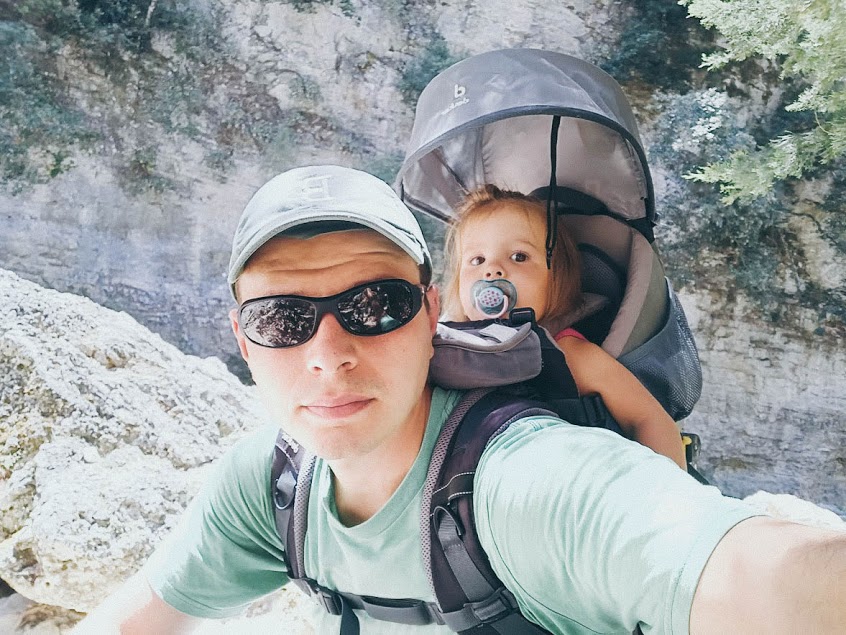
The language barrier
Ohhh, this is the biggest horror story. Everyone is afraid for their level of English, Vietnamese and Chinese, although the tourism industry in the world is so developed that the traveler needs to work very hard to really get lost. Especially if you are not particularly planning to go beyond the well-trodden tourist paths - that is a good idea for your first trip.
Almost everywhere in the world they speak English decently. And, the most interesting: there are a lot of people who speak Russian. I would say too much where. The world is full of completely unexpected places (at least in the same Vietnam) where you can see Russian inscriptions, and even locals specially learn this language to successfully negotiate with tourists.
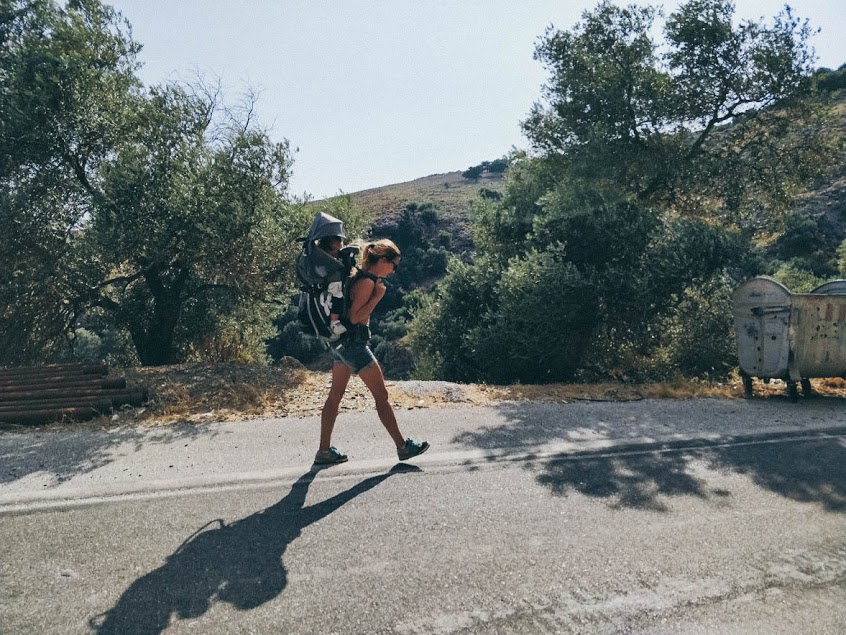
But if you are still drifted into some wilderness where they only speak the local language, there is a life hack: learn the words “hello,” “thank you,” “please.” These three words plus a smile and elementary pantomime will help almost everywhere. In addition, the farther the wilderness, the more pleasant and responsive people, so in most cases this can be a very interesting adventure.
Maps and Routes
A very useful thing is offline maps. There is not always internet if you went on an excursion to some mountains and gorges. You don’t always want to be in touch if you have a day off.
I really appreciated OsmAnd maps, where not only the main attractions and public transport stops are available, but also tracking routes. If you like to walk in nature, you will also appreciate.
You can still use Google Maps, Maps.me and Moovit - these are the most popular applications, but in general there are quite a lot of them. There are plenty to choose from.
Entertainment
Planning ahead is not only work, but also relaxation.In order to get the most out of your impressions and not regret that you missed something very interesting, it’s worth exploring the situation before your trip and making an approximate travel schedule.
It’s a good idea to look for interesting reviews and reports from other travelers. But everything is changing with tremendous speed, because the reviews of two or three years ago may already be irrelevant.
The best source of fresh information is Instagram. Especially in matters of "where to eat" and "what to see." Subscribe in advance to the accounts of people who live in the country you are interested in, organize tourist groups, or simply just recently visited there. Read their recommendations, compile a selection and form a route based on fresh impressions.
Transport and movement
There are a lot of options, from car rental to local transport and even hitchhiking. Everyone chooses what he likes and can afford.
In Germany and Greece, we rented a car several times, but also used trains and buses. But in Vietnam I had to do only public transport. Fortunately, you can live there without a car: the infrastructure is well developed, and we calmly moved by trains, buses, public transport and taxis.
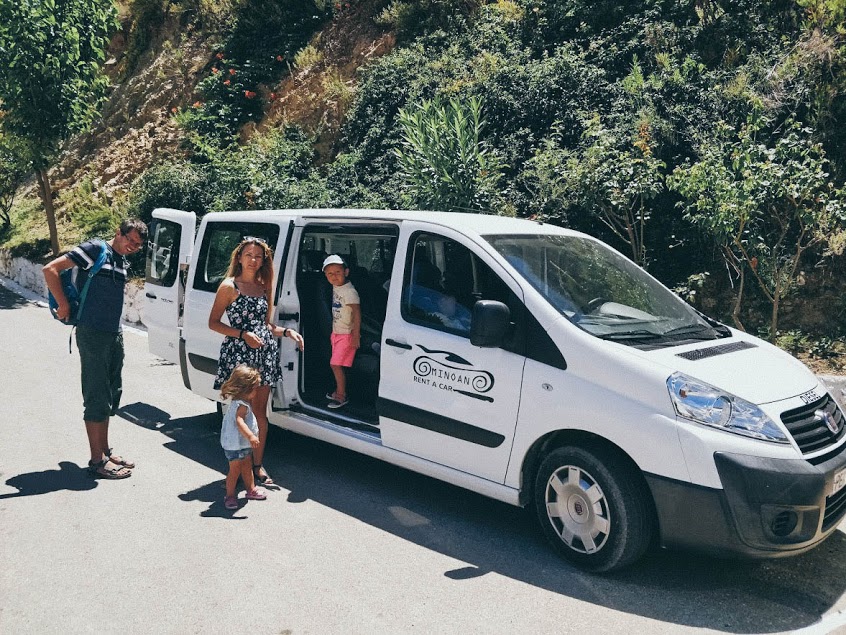
Several times, when I needed to go somewhere myself, I even used a taxi bike (in the city it cost some couple of dollars). There is a convenient Grab service, - something like Uber, - through which you can order a taxi, and motorcycle taxis, and even food delivery. And over long distances, for example, from Nha Trang to Hanoi, it is better to fly by plane. It will cost a little more, but the road will take not 30 hours, but only two.
If you need to book a car in advance, Booking has a search and an online taxi order - not everyone knows about it, but it’s useful, especially if you need to arrange a transfer from the airport and not sell a kidney after receiving a check. And at Skyscanner - search for rental offices where you can compare prices.
Nutrition
And in Europe and Asia, visit not those establishments that look pretty and are full of tourists, but those where there are many locals. Most likely, it will be both inexpensive and tasty - at least, because the owners are guided by those who can come to them again, and not leave tomorrow.
Even if the institution looks like a tent, similar to our Obolon , with simple plastic tables and chairs. The main thing is that it should be clean, smell good and have a lot of happy chewing people.

If you are in Asia, a separate joy is the night markets, where they sell everything in the world, including food. Of course, it’s not always worth trying something that looks strange (in many cases, no, especially if you are on the road tomorrow or working), but often you can have a very tasty dinner there. Again, see where the lineup is mostly local.
Insurance
As they say, the last in priority, but not in importance. Wherever you go, on a business trip or a simple tourist, get good insurance for yourself and your children. Not because in other countries you are waiting for maniacs and tsunamis, but because everything happens in life, you just know what to do in your native country, but not in a foreign country. And the $ 20-50 you spend on an insurance policy (depending on the country and duration of the trip) will fully pay off with your peace of mind.
Important: choose an insurance company yourself, based on reviews and advice from other people, and do not buy the policy "for show" from the first agent you come across. Especially if traveling with children.
And finally
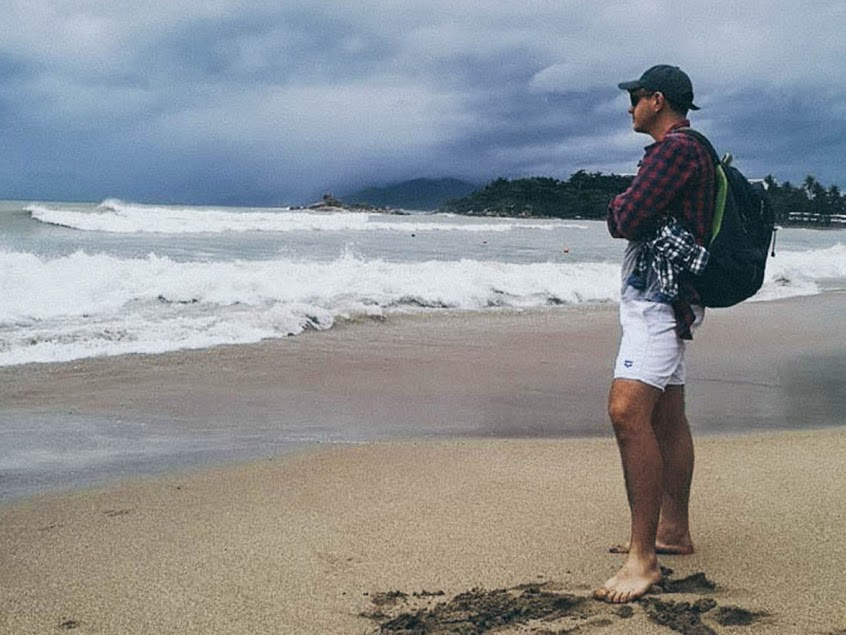
Of course, traveling work is not just about rainbows and unicorns. You have to discipline yourself and adapt to the team schedule. Somewhere you need to give up an interesting trip with family or friends on a weekday and, again, work. That is why I now try to travel longer: to have time to see everything, without a race and haste, and to feel that I really recognized another country.
But then you are traveling. You see new landscapes outside the window. You can go to the sea after work, have breakfast with tropical fruits and discover new places on the world map.
Well, minor difficulties - they are solved! The main thing is to plan a route in advance, read reviews and forums, and organize everything so that there is room for both work and entertainment.
All Articles